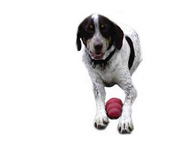
So Your Dog Has Addison's Disease
The diagnosis is in; it's Addison's Disease. All of us here at addisondogs.org remember hearing those words from our vet. Sometimes they brought up feelings of sadness or fear, occasionally relief to know what's going on. Then the vet starts talking about mineralo-somethings and prednisone and DOCP and daily this and monthly that and soon your head is swimming. You just want your dog back. That's how addisondogs.org came to be.
What is Addison's disease anyway?
Let's start with a brief overview of Addison's disease. It is the common name for hypoadrenocorticism, or adrenal insufficiency. It is a disease with symptoms that are common in many other ailments, making diagnosis difficult and sometimes a process of elimination. But once Addison's is correctly diagnosed, a properly treated dog can live a normal active life.
The adrenal, one on each kidney, is made up of two layers, the cortex and the medulla. The outer area, or cortex, secretes corticosteriod hormones such as cortisol and aldosterone. The medulla, part of the sympathetic nervous system, secretes epinephrine (adrenaline), which is generally not affected by Addison's.
There are three forms of Addison's disease: primary, secondary and atypical. Primary and atypical Addison's are usually the result of immune mediated damage to the glands. Secondary hypoadrenocorticism is from failure of the pituitary to stimulate the adrenals with adrenocorticotropic hormone (ACTH). It is important for you to know which type of Addison's disease your dog is being treated for.
I don't have a diagnosis
The symptoms of Addison's disease can be vague. More importantly, they are similar to the symptoms of many different problems. Initially, the dog may be listless, or seem depressed. Many dogs are described as just seeming off, or losing the normal sparkle in their eye. Lack of appetite is a good indicator.

SYMPTOMS
Vomiting
Diarrhea
Lethargy
Lack of appetite
Tremors or shaking
Muscle weakness
Pain in hind quarters
Other symptoms include gastrointestinal problems like vomiting and diarrhea. Pain in the hind quarters, or generalized muscle weakeness such as a dog that can't jump onto a bed or couch as he has done in the past is not uncommon. Shivering or muscle tremors may also be present. The most important thing to remember is that you know your dog better than anyone. If something seems amiss, have it checked out.
These symptoms may wax and wane over months or years making diagnosis difficult. If the adrenals continue to deteriorating, ultimately the dog will have an acute episode called an Addisonian crisis. Potassium levels elevate and disrupt normal functions of the heart. Arrhythmia can result and blood pressure drops to dangerously low levels. BUN and creatinine levels, generally indicators of kidney function, are often elevated. At this point many animals are diagnosed with renal failure, as the kidneys are unable to function properly. Typically animals are given IV solutions for rehydration, which may produce an almost miraculous recovery. This too, is a great indication that failure of the adrenals rather than of the kidneys is creating the symptoms.
How can you be sure it's Addison's?
One of the first things to look at when Addison's disease is suspected are the electrolyte levels. The two that are of greatest concern are the sodium (Na) and potassium (K). In addition to looking at these values, it is important to look at the ratio between the two.

Electrolyte levels are important,
but not a definitive test for Addison's.
Primary Addison's involves changes
in electrolytes while Atypical and
Secondary do not.
An ACTH stim test is the only
definitive test for diagnosing Addison's.
This number is derived by dividing K into Na and should be between 27 and 40. For example, a dog with a Na level of 145 and a K level of 4.5 would have a ratio of 32. A dog in an Addisonian crisis will typically have a low Na level, elevated K and low ratio. (see laboratory results for more info)
While electrolyte levels are important indicators, they are not the definitive test to determine Addison's disease. In fact, with secondary and atypical hypoadrenocorticism, electrolyte levels may not be affected. For definitive diagnosis the dog is given a the ACTH stimulation or response test. This tests the ability of the adrenal glands to produce the corticosteroid hormone cortisol.
To perform the ACTH stimulation test, an initial blood sample is drawn and the cortisol level is measured. The dog is injected with a form of pituitary hormone ACTH that tells the adrenals to produce cortisol. After an hour, blood is drawn again, and the cortisol level measured. Resting cortisol should range from 1-4 ug/dl in the average dog, and should be significantly higher, in the range of 6-20 ug/dl, post-stimulation. (These numbers may vary depending on the lab.) If resting cortisol is low and the dog has no or a low response to the stimulation, the diagnosis is Addison's disease. Be aware that some glucocorticoids, such as predinsone, can affect the results of the ACTH test, while dexamtheasone does not.
Keeping on top of it.
There are several medications used to treat Addison’s. The first type acts as a mineralocorticoid and replaces the aldosterone – the hormone responsible for maintaining electrolyte levels. It is replaced with either an oral medication called Florinef ™ (fludrocortisone acetate) or the injectable Percorten-V™ (desoxycorticosterone pivalate or DOCP).

Primary Addison' requires the
replacement medications of
mineral corticoids.
Atypical and Secondary require
the replacement of glucocorticoids only.
Atypical Addison's can become Primary
and requires careful monitoring of
your dog.
Addison's dogs may require additional
glucocorticoids during periods of stress, injury or surgery.
For dogs that have atypical or secondary Addison’s neither of these medications are used because the production of aldosterone isn’t effected and electrolytes remain in balance.
In addition to replacing the aldosterone, the cortisol, or glucocorticoids, normally secreted by the adrenals must also be replaced. This is typically done with an oral form of prednisone or hydrocortisone. With atypical and secondary Addison’s the glucocorticoid is the only medication given.
Bottom Line
While your dog with Addison’s disease will need medications and monitoring for the rest of his life, most dogs with Addison’s can return to their favorite activities. You will learn to read your dog, understand what his stress triggers are and follow your instincts in his care. Together, you will overcome ADversity and learn from this experience. You will help your dog lead a normal, active and fun-filled life. Continue Reading »»
Loading
CONTINUED READING
EDUCATIONAL READING
Some documents require
Adobe PDF Reader

Addison Dogs Interview
With Dr. Julia A. Bates, DVM, DACVIM
Lower Initial Dose Desoxycorticosterone Pivalate for Treatment of Canine Primary Hypoadrenocorticism
ABC's of Addison's
by Karen Selbert, DVM
Novartis Roundtable Discussion
The Great Pretender
Addison's Disease
Testing For Addison's Disease
Understanding ACTH Stimulation Test
Updates on Hypoadrenocorticism
Glossary of Terms
EXCELLENT RESOURCES
BROCHURE DOWNLOADS

HELPFUL CALCULATORS
DOCP Calculator
Electrolyte Ratio Calculator
Glucocorticoid Calculator

YOU ARE NOT ALONE

Goodshop.com is working with Addison Dogs to help our cause. When you shop through Goodshop at thousands of stores online , they'll donate up to 20% of your purchase back to us, at no cost to you! They also offer coupons at some of your favorite retailers, so you can save while supporting us!
You can also help raise money for Addison Dogs just by searching the web!

READ THE FAQ's
Addison dogs can live
a happy normal life
when properly treated!
